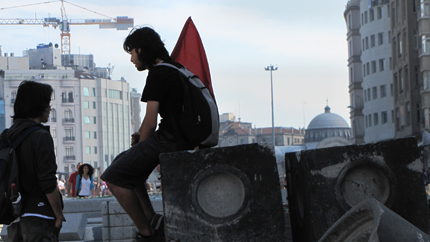Breaking Crisis
Works by: Norman Cowie, Elisabeth Marjanović Cronvall & Marta Dauliute, Beatrice Gibson, Jean Herman, Eleni Kamma
with: Eleni Kamma Elisabeth Marjanović Cronvall & Marta Dauliute
Screening
Sat, 06.02.2016
12:00 – 14:00
Theatersaal
Actua Tilt, Jean Herman, FR 1960, 12′
The Third Wave, Norman Cowie, US 1995, 3′
Crisis Document. A Survival Guide, Elisabeth Marjanovic Cronvall & Marta Dauliute, SE 2015, 15′
F for Fibonacci, Beatrice Gibson, UK 2014, 16′
Yar bana bir eğlence. Notes on Parrhesia, Eleni Kamma, BE/NL 2015, 37′
The transformation of Western industrial society into a service and information economy is coupled with the unrestricted subjugation of the environment to market imperatives. Financial transactions are executed by computer programs in milliseconds: money makes money. The unequal distribution of wealth and security, evidenced in global refugee movements, produces a sense of permanent crisis. Conversely, new forms of solidarity, resistance, and struggles for democratic rights and economic participation are emerging. Against the background of these volatile developments, this film selection presents an impressive range of artistic and critical analyses of the present.
YAR BANA BIR EĞLENCE. NOTES ON PARRHESIA
by: Eleni Kamma
BE/NL
2015
37′
In her first cinematographic work, artist Eleni Kamma revisits the Ottoman tradition of the Karagöz theatre and its role in the creation of a political voice that defied censorship for a long time. Karagöz symbolizes the « little man » who, through the use of empty phrases, the illogical, the surrealistic, extreme obscenity and repetition, speaks of what people want to hear and need to say. Against this background, Yar bana bir eğlence. Notes on Parrhesia reflects upon the term « parrhesia », which implies not only the freedom of speech, but also the obligation to speak the truth for the sake of the common good, even at personal risk. This is where Kamma links to the Gezi Park protests in 2013, in which humour and creativity were key elements of resistence. Archival footage and staged scenes alternate with Cypriot, Greek and Turkish Karagöz masters discussing language, history and the political message of their art today.
[sociallinkz]
